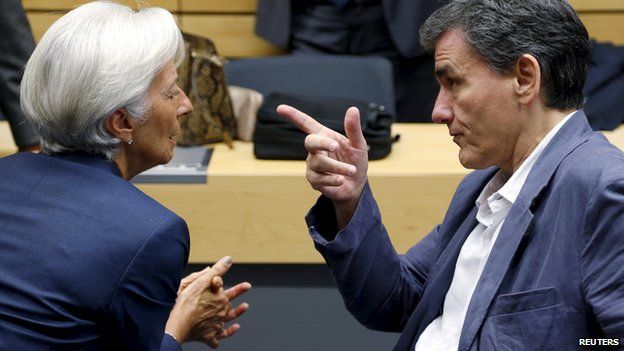The Greek crisis is shaking the IMF to its core
- Published

The Greek crisis, having shaken the eurozone to its core, is likely to have a similar seismic effect on another massive institution, the IMF.
The International Monetary Fund's exposure is small compared with the Eurozone.
In the 2010 bailout it paid out over €20.7bn and in the following 2012 rescue it contributed €11.6bn
The real threat is to its credibility as the world's biggest multinational lender.
It is a story of conflict with Europe - and with itself.
On July 7 IMF managing director Christine Lagarde said that the situation in Greece demanded a restructuring of debt.
Chief economist Olivier Blanchard told the BBC a few days later that the IMF had been privately urging the European creditors for several months that sizeable debt relief was the only credible option.
By going public the IMF hoped it could swing the argument against the European creditors, in particular Germany who believed debt forgiveness was unacceptable.
In what was obviously a co-ordinated move US Treasury secretary Jack Lew came out with a near identical statement.
In short, they argued Greece's debt position was unsustainable. There had to be restructuring.
Fraction
As the world knows, the agreement was proposed with Greece - without any debt restructuring at all, as the IMF stood by.
Now the IMF has made a dramatic attack on the deal, saying it will have nothing to do with it.
It's a picture of fraction and impotence that could do lasting damage to an organisation that has been the world's lender of last resort for 70 years.
The problem started when the IMF entered the euro crisis in 2010 with the European Central Bank (ECB) and the European Commission (EC) as part of the Troika.
Many believe that as an international economic institution it was on thin ice dallying with a political construct such as the euro, not to mention the European powers represented through the EC and the ECB.
Susan Schadler, Senior Fellow, CIGI and former deputy director, European Department IMF says: "It unleashed unusually severe political influence on the IMF, and in turn the IMF could not bring the full force of its vast experience in managing financial crises and ensure that all options for dealing with the crisis were put on the table and carefully considered."
Perhaps more important, it broke its own rules.
Its Exceptional Access Policy, which allows nations in dire straits access to its funds, has four strict criteria.
Criterion number two requires that a "rigorous and systematic analysis indicates that there is a high probability that the member's public debt is sustainable in the medium term".
IMF officials in all honesty could not agree even back in 2010 that, with the kind of reforms and austerity measures needed, Greece's economy could sustainably support the billions of euros of debt on offer.
However the criteria were tweaked, allowing the sustainability issue to be pushed to one side on the grounds that there was a real risk that the Greek crisis was a systemic risk to the international financial system.
Reputation
But the sustainability issue has come back to haunt the IMF, with Greece defaulting on its IMF debt, the first developed nation to do so.
Now, by demanding that Greece's debts are "sustainable" it is quoting the very criterion it laid aside five years ago.
Ms Schadler says: "Better late than never, but it is very very late, and the five years has been damaging not just to its credibility but to its effectiveness in how it gets countries out of debt crises."
By weakening the criteria by which it operates the IMF jeopardised its reputation as the world's lender of last resort.
That reputation is crucial.
It has allowed the IMF to claim "preferred status" as a lender, i.e. it can generally demand to be first in line when a country pays off its debts. That standing as the leader of the world's international lenders allows it to lend at low rates and impose strict conditions on its borrowers.
Certainly, those conditions have been the target of criticism over the decades.
Many believe it has been a slave to free market economics, imposed inappropriate privatisation programmes, tough spending cuts and high interest rates which can turn modest problems into full blown crises.
Critical position
There is truth in all of this. But it is also worth remembering the IMF's Heavily Indebted Poor Countries (HIPC) Initiative has approved debt reduction packages for 36 countries, 30 of them in Africa, which over time is providing $76 billion in debt-service relief.
Philippa Malmgren, a former Special Assistant for Economic Policy to President Bush, believes the IMF is at a critical position in its history - because there are others only too ready to step into its shoes.
"China and other developing countries have been asking for changes in the way the IMF is run - and they have not got those changes. So they have gone off and set up an alternative, the Asia Infrastructure Investment Bank.
"Make no mistake, this is designed as a replacement for the IMF - a whole new architecture designed to funnel investment into China's own markets and its own companies."
"The IMF's level of misjudgement here in Greece is of epic proportions. If you can't save Greece how can you save bigger problems when they come along? Like France. Because the real problem isn't Greece, it's the bigger ones further down the track."
- Published15 July 2015
- Published16 July 2015
- Published15 July 2015